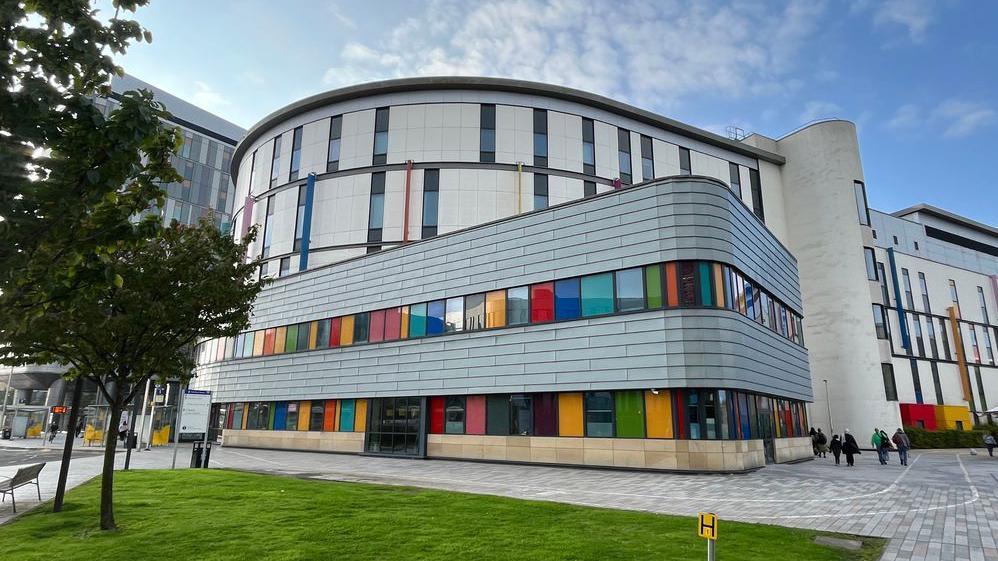Toddler could have been saved from infection, mum tells inquiry

Archie Donald died at Glasgow’s Royal Hospital for Children, part of the Queen Elizabeth University Hospital campus
- Published
A bereaved mother has told an inquiry that her toddler could have been saved from a fatal infection if doctors had caught it sooner.
Caitlin Donald, 32, said she “lost everything” after three-year-old Archie Donald died on 20 November 2019.
Archie, who had a chronic kidney condition, had been admitted to the Glasgow’s Royal Hospital for Children - part of the Queen Elizabeth University Hospital campus - for treatment just hours before.
A fatal accident inquiry (FAI) into his death began on Monday and is expected to focus on the identification and treatment of the infection, the delay in admittance and record sharing.
It heard that Archie, who was born on 22 July 2016, suffered from congenital nephritic syndrome (CNS).
CNS is a chronic kidney condition that required Archie to have ongoing medical treatment. In 2017 his left kidney was removed.
This meant that he had regular outpatient appointments and had been admitted to hospital with illnesses on multiple occasions.
He attended hospital twice in the month leading up to his final admission and on both occasions, clinical staff did not suspect the bacterial endocarditis infection that a post-mortem later identified as the cause of death.
Archie's mother Caitlin Donald told the inquiry: “Knowing that Archie died from an infection that could have been treated, rather than his CNS, makes it harder for me to understand and now need to live the rest of my life without my Arch by my side.
“I blame myself every day for not pushing the doctors to investigate his deterioration more."
She said she "knew something was not right" with Archie but she trusted the staff who had cared for him since he was six weeks old.
Ms Donald said it was "obvious" to her and her family that their were issues within the hospital that "failed" Archie.
She told the FAI: “If the infection markers in his blood tests had been acted on earlier, if tests had been done that should have been done sooner, if someone recognised that Archie actually had an infection sooner, there is a chance my son would still be alive today."
Doctor 'horrified'
Dr Heather Maxwell examined Archie on 5 November 2019 and told the inquiry she had been "worried" about his kidney function.
She admitted that she failed to spot the raised C-reactive protein (CRP) level in the test results which would have indicated a possible infection.
The retired doctor told the inquiry: "I had it in my mind that CRP was unremarkable. That was my error and I was horrified that I didn't (check it).
"I consider myself a careful and cautious doctor, and I thought I had done everything, I thought I had seen all of his results and I was horrified that despite the system we had in place that happened."
When asked what she would have done differently if she had spotted the CRP figure, Dr Maxwell said she would have asked to see him again sooner for more tests.
She added she would not have immediately linked it to bacterial endocarditis, which she said was "a rare condition in children who have structurally normal parts".
A joint minute of agreed evidence stated Archie attended the children's hospital the day before his death for a routine appointment where he was found to be “lethargic, breathless and had reduced appetite.”
Dr Heather Maxwell heard the sound of a heart murmur which had not been noted previously.
The inquiry heard she arranged for urgent blood tests and decided to admit Archie for an echocardiogram (echo) test for bacterial endocarditis.
However, the inquiry heard there was no bed available on the renal ward and Archie and his mother had to wait in the outpatient department until a bed was found at 19:15.
At this point Archie had a temperature of 38.3C as well as high blood pressure. The ECHO test was also delayed until the next day.
In the early hours of the morning, he was found to be unsettled and "grunting" while breathing, with a heart rate of between 160-178 beats per minute.
The inquiry heard that his mother pressed the emergency buzzer at 03:25 due to Archie vomiting and again 11 minutes later after he stopped breathing.
Attempts to resuscitate him failed and his life was pronounced extinct at 04:36.
A post-mortem revealed that the cause of death was a “subacute bacterial endocarditis.”
A victim impact statement from Archie's mother was read to the inquiry at Glasgow Sheriff Court, detailing how she had experienced depression and anxiety since his death.
She said: "It has taken me years to get to a stage where I feel slightly ‘normal’.
“The life I should be living just now is a massive difference to the life I am currently living, and Archie's loss is something that I will never get over."
The inquiry continues before Sheriff Tom Millar.